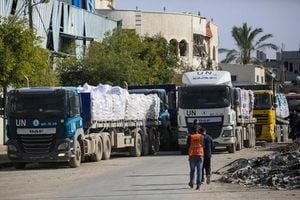In a revealing segment aired on April 24, 2025, on France 2's "Complément d'enquête," former La France insoumise (LFI) deputy Danielle Simonnet opened up about what she describes as "political moral harassment" from party leader Jean-Luc Mélenchon. This disclosure sheds light on the tensions that erupted during the lead-up to the legislative elections in June 2022, particularly concerning the candidacy of Sophia Chikirou, a close advisor to Mélenchon.
The conflict began in December 2021 when Chikirou announced her intention to run for the 15th district of Paris, a constituency where Simonnet had long been established and was also a candidate. Simonnet opposed Chikirou's entry, leading the LFI electoral committee to assign Chikirou to the adjacent 6th district. However, this decision was met with resistance from local activists, who were not pleased with Chikirou's parachuting into their area.
In a dramatic turn of events, Mélenchon accused Simonnet of inciting local dissent against Chikirou. Despite Simonnet’s insistence that she was not involved in any rebellion, she began receiving increasingly aggressive messages from Mélenchon via Telegram. These messages, which Simonnet later shared with "Complément d'enquête," included threats and accusations that escalated over a three-month period.
The first message Simonnet revealed was a terse warning from Mélenchon: "Ne crois pas que je ne me rende pas compte," which translates to "Don’t think that I’m not aware." This was just the beginning of a barrage of messages that became progressively more hostile. One particularly menacing message included the phrase, "Je vous passerai tous à la trappe et c’est tout. J’attends d’être scrupuleusement entendu," meaning "I’ll take you all down, and that’s it. I expect to be heard thoroughly." These exchanges left Simonnet feeling threatened and isolated.
Despite the intimidation, Simonnet remained committed to her political duties, stating, "Se lever tous les matins, faire du porte-à-porte, mener la campagne de Jean-Luc Mélenchon alors que vous aviez dans votre téléphone tous ces messages-là, d’une violence absolue, ce n’était quand même pas évident." This translates to, "Waking up every morning, going door to door, campaigning for Jean-Luc Mélenchon while having all those messages of absolute violence on your phone was not easy at all." Her loyalty to the party and its strategies kept her engaged, even amidst the turmoil.
In the wake of these revelations, LFI's Mathilde Panot, who leads the party group in the National Assembly, claimed she was unaware of the severity of the messages, characterizing them as mere "engueulades" or heated arguments typical in political discussions. This dismissal did little to alleviate Simonnet's concerns, as she continued to feel that her experiences were being minimized.
Fast forward two years after the tumultuous events, and Simonnet decided it was time to confront her party about the treatment she endured. Following new allegations against Chikirou in October 2023—where she was accused of overbilling her services during the 2017 presidential campaign—Simonnet penned a three-page letter to her party. In this letter, she reiterated her claims against Chikirou, which included accusations of homophobic messaging and aggressive management tactics.
Simonnet concluded her letter by emphasizing the importance of accountability within the party, stating, "Compte tenu de notre attachement à la lutte contre la souffrance au travail et contre le harcèlement moral, il me semble essentiel que Sophia Chikirou nous fournisse des explications," which translates to, "Given our commitment to fighting workplace suffering and moral harassment, it seems essential that Sophia Chikirou provide us with explanations." However, she noted that these explanations were never forthcoming.
The situation escalated further in September 2024 when Chikirou was indicted for "aggravated fraud" related to her financial dealings with the party, further complicating the political landscape within LFI. Simonnet's experiences have raised questions about the internal dynamics of the party and the treatment of its members, particularly women.
As Simonnet continues to navigate her political career, having found refuge within the ecologist group in the National Assembly after her exclusion from LFI, her story highlights the often tumultuous and hostile world of political campaigns. The fallout from her revelations promises to have lasting implications for the LFI and its leadership.
In a political landscape rife with conflict and power struggles, Simonnet's testimony serves as a stark reminder of the personal toll that such battles can take on individuals within the political arena. As the public awaits further developments, the question remains: how will the LFI address these serious allegations and the culture within its ranks?





